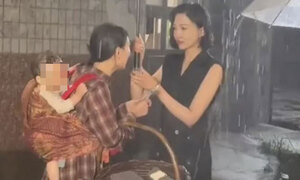Despite spending trillions of mostly borrowed dollars, the U.S. has not done well in the post-Cold War environment, as reflected by our diminished worldwide standing and influence.
We hadn’t learned much about Mikhail Gorbachev in March 1985, when he was first named General Secretary of the Soviet Union after Konstantin Chernenko died, and as we began the Nuclear and Space Talks (NST) in Geneva.
The Soviets had walked out of all arms control talks after Mr. Reagan introduced strategic Defense Initiative (SDI) in March 1983 — and initiated a global propaganda campaign to defeat Mr. Reagan’s November 1984 re-election.
After that failure, the Soviets sought to block SDI in resuming these “new” arms-control talks, in which we participated. In effect, it was SDI that brought the soviets “back to the table.”
Mr. Gorbachev introduced “Perestroika” (Russian for political restructuring) and “Glasnost” (Russian for Openness) in 1985 and early 1986, exposing all the warts and scars of the failed and totally corrupt Soviet socialist system.
Then following Mr. Reagan’s October 1986 refusal to give up SDI in Reykjavik and his June 1987 “Tear down this wall!” challenge in Berlin, our talks progressed markedly.
We achieved the first-ever verifiable arms-control treaties to reduce nuclear arm. The Soviet Union crumbled in 1991. The Cold War ended.
For Mr. Gorbachev, the war was over - and lost—but for a 39-year-old KGB Officer, Vladimir Putin, a new war was just beginning.
What followed for us was a lengthy period of “head in the sand” national security policy, as we generally ignored the threat from radical Islam, despite obvious reasons to take it very seriously.
줄어든 우리의 세계적 지위와 영향력 (1)
헨리 쿠퍼(국가안보 전문가)
대부분 빌린 돈 수조 달러를 지출했음에도 불구하고, 우리의 줄어든 세계적 지위와 영향력에 반영된 바와 같이 미국은 냉전 이후의 환경에서 잘하지 못했다.
콘스탄틴 체르넨코가 죽은 뒤 1985년 3월 미하일 고르바초프가 구소련의 공산당N서기장에 처음 지명되었을 때나 제네바에서 핵 및 우주 회담을 시작했을 때 우리는 그에 관해서 많은 것을 알지 못했다.
레이건이 1983년 3월에 전략방위구상을 도입한 다음 구소련 사람들은 모든 군비통제 회담에서 퇴장했고 레이건을 1984년 대통령 재선에서 패배시키기 위한 세계적인 선전운동을 개시했다.
선전운동이 실패한 다음 구소련 사람들은, 우리가 참여한 일련의 “새로운” 군비통제 회담을 재개하여 전략방위구상을 봉쇄하려고 시도했다. 구소련인들의 “테이블 복귀”를 실현한 것은 사실상 전략방위구상이었다.
고르바초프는 구소련의 정치 개혁인 “페레스트로이카”와 개방 정책인 “글라스노스트”를 1985년과 1986년 초에 도입함으로써 완전히 부패하여 실패한 구소련 사회주의 체제의 모든 결점과 상처를 드러냈다.
그에 이어서 레이건이 1986년 10월 레이캬비크에서 전략방위구상 포기를 거부했고 1987년 6월 베를린에서 “이 장벽을 철거하라”는 도전적인 제안을 한 다음 우리의 회담은 눈에 띄게 진전을 보였다.
우리는 사상 최초로 핵무기를 줄이기 위한 검증 가능한 일련의 군비통제 조약을 성취했다. 구소련은 1991년 허물어졌다. 냉전은 끝났다.
고르바초프에게는 전쟁이 끝났고 패배했지만 39세의 KGB 간부인 블라디미르 푸틴에게는 새로운 전쟁이 방금 시작되었다.
우리는 뒤이어 오랜 기간 “모래 속에 머리를 파묻는” 국가안보정책을 취했다. 과격파 이슬람을 매우 진지하게 받아들여 할 이유가 다수였음에도 불구하고 그 위협을 전반적으로 무시하는 우를 범했다.
역주=오성환 외신전문위원 suhwo@segye.com
△standing : 지위 △initiate : 착수시키다 △in effect : 사실상 △warts : 결점, 무사마귀 △restructure : 개혁하다, 구조를 조정하다 △markedly : 현저하게, 두드러지게 △first-ever : 사상 최초의 △crumble : 허물어지다
Copyright ⓒ 세계일보. 무단 전재 및 재배포 금지
![[설왕설래] 금 한 돈 100만원 시대](http://img.segye.com/content/image/2026/01/27/128/20260127518581.jpg
)
![[데스크의 눈] 감동 없는 합당, 대의 없는 단식](http://img.segye.com/content/image/2026/01/27/128/20260127518594.jpg
)
![[오늘의 시선] ‘협치와 통합’의 다리를 다시 세우자](http://img.segye.com/content/image/2026/01/27/128/20260127518564.jpg
)
![[김상미의감성엽서] 타자기 사랑](http://img.segye.com/content/image/2026/01/27/128/20260127515626.jpg
)








